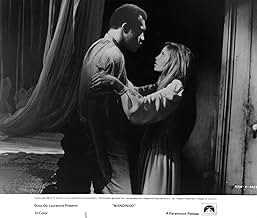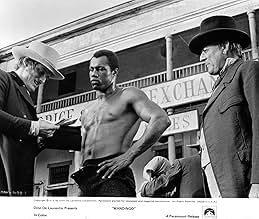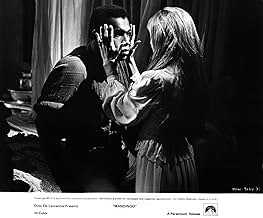ÉVALUATION IMDb
6,5/10
4,5 k
MA NOTE
Un propriétaire d'esclaves dans les années 1840 fait suivre à l'un de ses esclaves une formation de combattant à mains nues.Un propriétaire d'esclaves dans les années 1840 fait suivre à l'un de ses esclaves une formation de combattant à mains nues.Un propriétaire d'esclaves dans les années 1840 fait suivre à l'un de ses esclaves une formation de combattant à mains nues.
- Director
- Writers
- Stars
- Prix
- 1 victoire au total
Debbi Morgan
- Dite
- (as Debbie Morgan)
Avis en vedette
This film, despite some controversy about it's biracial sex scenes when it was initially released, seems to have faded from memory. Given the degree of sex, violence, and unadulterated exploitation of slavery in the antebellum South, that's a surprise, because I saw this flick nearly ten years ago and STILL can't forget it! Those whose image of the old South has forever been defined by GONE WITH THE WIND as romantic and chivalrous and pick up this movie in the video store(the cover art on the box resembles that famous pose with Gable and Leigh)thinking they're about to be trasported to Tara ought to run like Hell! James Mason and his lame son Perry King live on a plantation and own slaves body and soul. Well, at least the body part, as we see when Mason strings an errant slave upside down, strips him, and pattles his butt with a perforated paddle. Son King takes a more tender approach, as he sleeps with the female slaves, especially Brenda Sykes, whom he takes as his mistress. However, he marries Susan George to provide an heir, and presents her with a ruby choker. He also gives Sykes the matching earrings. When George learns of the relationship(Sykes wears the earrings while she serves dinner to George and King on their first night at the plantation), and Kings learns George has slept with her brother, the marriage hits the skids. George drowns her sorrows in lots of sherry and lots of Ken Norton, a slave Perry has purchased specifically for fighting other slaves for betting. George becomes pregnant, and when the baby comes, it hits the fan! It's hard to believe that anyone in 1975 could see this film as anything but exploitation of a very dark period in American history. Didn't anyone cringe at the sight of King going in to "take pleasure" from a female slave in a bed and the woman groans, "I too black for you", or Ken Norton standing stoically on the auction block of a slave sale while an old woman gropes around inside his loincloth? The video edition of this film I saw was from the early eighties, when movie studios did their transfers from the first worn-out prints the could grab, and may have had a muddy, faded look because of this, but it's hard to believe this thing came from a major studio. You'd certainly wouldn't know it from the production values, because the film looks as if the filmmakers didn't spend a penny more than they had to(we're treated to interior scenes inside a plantation house curiously devoid of furniture). With all these setbacks, it's hard to understand why this movie hasn't garnered even a semi-cult following. If you're in the mood to be offended on all levels and don't treasure some romanticized Hollywood image of the old South, grab MANDINGO.
I can see why this was controversial, and no doubt it would be if it were released now (2013). It's stunningly unlike Gone with the Wind. The style is extreme Southern Gothic, (not to be confused with camp). Some shades of Tennessee Williams but goes beyond where he dared. The dialogue is a bit difficult, and DVD has no English subtitles, but you'll be rewarded if you stick with it. (No need to understand every word). I agree that Tarantino was influenced by it but his approach to the subject matter is very different. Mandingo stands on its own as a major work of the 1970s and it's certainly a film that deserves to be better known. Striking photography and music throughout. This film panders to no one, nor does it simplistically tell the viewer what to think about anything. We have the feeling we're on our own with this. Maybe it's no accident that that feels liberating. Fasten your seat belts and see it.
Mandingo seems to divide it's audience strongly between love and hate and that's not really surprising; the film features some real nasty elements and the way that it's all done with a highly quality 'period drama' sort of style means that it will likely miss it's supposed intended audience - although it seems to have found a good fan base among exploitation fans. The film is liable to shock modern audience for its racial themes and strong racial tone; it didn't bother me all that much to be honest as it suits the film within it's context and helps to enforce its exploitative nature, which in turn makes Mandingo more powerful. The film takes place in the south of America during the 1840's and the main focus of the plot is on slavery. White farm owner Hammond Maxwell one day discovers the fighting talent of one of his black slaves and soon decides to toughen him up for battle with other slaves. He's sympathetic with his slaves and soon becomes affectionate with one of the women, which doesn't sit well with his wife Blanche who, for revenge, forces the top fighter to sleep with her.
Anyone going into this film expecting a serious look at slavery will be either disappointed or annoyed (maybe both), but if you go into it expecting some nasty exploitation, you might find a lot to like. The film gives an unflinching look at a more primitive society and it actually more shocking for its tone and implications than the events that take place in it (although the film does include plenty of racism, torture and rape scenes). The way that the film depicts the black slaves as animals makes for uncomfortable viewing and the way that society was segregated into 'white masters' and 'black slaves' is always enforced on the viewer. The performances sit better with the exploitation side of the film rather than the serious drama side as none of them are particularly brilliant; although the three leads do fit into their roles well. Overall, this is clearly not a film for everyone and I'm not in any way saying that the film's bad reputation is in any way undeserved; but Mandingo is certainly an interesting film and I would say it is at least worth seeing.
Anyone going into this film expecting a serious look at slavery will be either disappointed or annoyed (maybe both), but if you go into it expecting some nasty exploitation, you might find a lot to like. The film gives an unflinching look at a more primitive society and it actually more shocking for its tone and implications than the events that take place in it (although the film does include plenty of racism, torture and rape scenes). The way that the film depicts the black slaves as animals makes for uncomfortable viewing and the way that society was segregated into 'white masters' and 'black slaves' is always enforced on the viewer. The performances sit better with the exploitation side of the film rather than the serious drama side as none of them are particularly brilliant; although the three leads do fit into their roles well. Overall, this is clearly not a film for everyone and I'm not in any way saying that the film's bad reputation is in any way undeserved; but Mandingo is certainly an interesting film and I would say it is at least worth seeing.
I just watched Mandingo and can't for the life of me figure out why this film would get any critical reviews. You can't criticize the truth unless you yourself are part of the lie or involved in hiding the truth or you just want to ignore the truth and live in a fantasy world. Like those freaks that refuse to acknowledge the holocaust really happened or say it wasn't that horrible. This film hits you with the truth about 1840ish slavery with a vengeance, shocking, sickening, and uncomfortable as it should be. It doesn't sugar coat the South and especially the Deep South with shades of romantic Gone with the Wind feel sorry for us we lost our culture nonsense, but shows in detail all the dehumanizing, sickening, savage racist attitudes that existed in the south at that time. The buying and selling of human beings should be as sickening and repulsive as it gets and left to me this film would be mandatory viewing by all high school students in this country to help them understand the barbarism of slavery and how it's residue still affects and infects this country to this day. If you get a chance to rent or view this film a note of advice, be prepared for the truth!
Quentin Tarantino has called Mandingo one of the few big budget exploitation films Hollywood has ever produced, and you can definitely see a lot of this film in his Django Unchained. I'm not sure I'd go as far as calling this an exploitation film, but it's certainly startling at times and deals with the subject of slavery without backtalk or ambiguity.
The movie takes place in Deep South prior to the American Civil War. Slavery is at its highest bloom and it's just as bad as you've probably heard. First night rights are freely exercised, slaves are just one step above animals, sold like cattle and while they're not beaten daily – they still need to work, and it's not like you beat your cows daily, either – it doesn't take much for them to incur the wrath of their masters.
The movie is also notable in that it uses the term 'mandingo' somewhat correctly. The term referred to any slave of the highest quality and not just to those who fought against one another. Though even that fighting might be a myth. The movie tells the tale of one particular manor, its owners and the pair of mandingo slave that were brought there, one of them to be trained as a fighter.
It's a tough movie to sit through if you're squeamish and while it's not overly gluttonous in its depictions of violence, like Django Unchained is, it doesn't shy away from them either or pull its punches. A very good movie to check out if you liked Django and/or are looking for a darker historical piece.
The movie takes place in Deep South prior to the American Civil War. Slavery is at its highest bloom and it's just as bad as you've probably heard. First night rights are freely exercised, slaves are just one step above animals, sold like cattle and while they're not beaten daily – they still need to work, and it's not like you beat your cows daily, either – it doesn't take much for them to incur the wrath of their masters.
The movie is also notable in that it uses the term 'mandingo' somewhat correctly. The term referred to any slave of the highest quality and not just to those who fought against one another. Though even that fighting might be a myth. The movie tells the tale of one particular manor, its owners and the pair of mandingo slave that were brought there, one of them to be trained as a fighter.
It's a tough movie to sit through if you're squeamish and while it's not overly gluttonous in its depictions of violence, like Django Unchained is, it doesn't shy away from them either or pull its punches. A very good movie to check out if you liked Django and/or are looking for a darker historical piece.
Le saviez-vous
- AnecdotesJames Mason admitted in interviews that he only made the film to make his alimony payments.
- GaffesDuring Mede's first fight in the city, he and his opponent are wrestling on the grass. When they roll over on the floor, the grass moves like a slipping carpet would, revealing it to be a sheet of artificial green, probably lying on the floor of a sound stage.
- Autres versionsThe international version of the film (released on PAL region 2 DVD) contains a different cut of the film that runs approx. 5 minutes shorter than the U.S. release but also has many scenes presented in alternate clothed takes. In all 12 scenes were either trimmed or re-edited with alternate shots/angles/takes:
- Scene where slave is bent over and inspected for hemorrhoids is cut.
- Scene where the wench is being prepared for her deflowering is presented in an alternate take where her breasts are not exposed.
- Scene with pregnant wench is shot with alternate angles to obscure nudity. Perry King's full frontal nudity is cut and replaced with a closer shot that reveals he is wearing shorts when he kneels down to pray (It looks like a goof - only a bit of the waistband can be seen at the corner of the frame).
- Alternate takes of the slave being strung up to be beaten are used to obscure nudity, and many shots of him being beat and left bloody are cut.
- A few seconds where Perry King's cousin rips off a wench's dress and bends her over to begin beating her is cut to remove nudity. The beating is left intact.
- The slave market scene is edited to remove the topless wenches on display, and the shot where the German widow sticks her hand into Ken Norton's shorts and "inspects" him is cut short. The second shot with her hand in and then removing it is left intact though.
- An alternate take is used with a prostitute clothed rather than nude at the bawdy house.
- A few seconds of a prostitute rubbing on Perry King's crotch is cut.
- An alternate take is used during the fight at the bawdy house so that a prostitute is seen holding her dress up while she cheers whereas in the original she lets it fall and her breasts be exposed.
- The entire scene between Perry King and Brenda Sykes in which she asks him if he'll let their child go free is presented in alternate clothed takes. In the original film they are both completely nude. Even the camera angles and setups are the same, only with clothes in the international version.
- In the scene where Ken Norton fights a man to death one long shot where the other fighter claws his back is cut. Also cut is when Ken bites down on the other fighter's neck, is pulled off, and then bites into his neck again. All the close-ups are cut.
- The Susan George/Ken Norton love scene is almost entirely missing. Ken Norton's nudity is cut, and then the scene ends in an alternate take when the two go out of frame onto the bed. The original scene went on for much longer and exposed Ken Norton's buttocks and Susan George's breasts. The German theatrical version does not feature any of these alterations and is identical to the U.S. release.
- ConnexionsFeatured in Tôt ou tard (1979)
- Bandes originalesBorn in This Time
Music by Maurice Jarre
Lyrics by Hitide Harris (as Hi Tide Harris)
Sung by Muddy Waters
[Played during opening title and credits]
Meilleurs choix
Connectez-vous pour évaluer et surveiller les recommandations personnalisées
Détails
- Date de sortie
- Pays d’origine
- Langues
- Aussi connu sous le nom de
- Bitmeyen Kavga
- Lieux de tournage
- sociétés de production
- Consultez plus de crédits d'entreprise sur IMDbPro
Box-office
- Brut – États-Unis et Canada
- 2 433 010 $ US
- Durée2 heures 7 minutes
- Mixage
- Rapport de forme
- 1.85 : 1
Contribuer à cette page
Suggérer une modification ou ajouter du contenu manquant



































